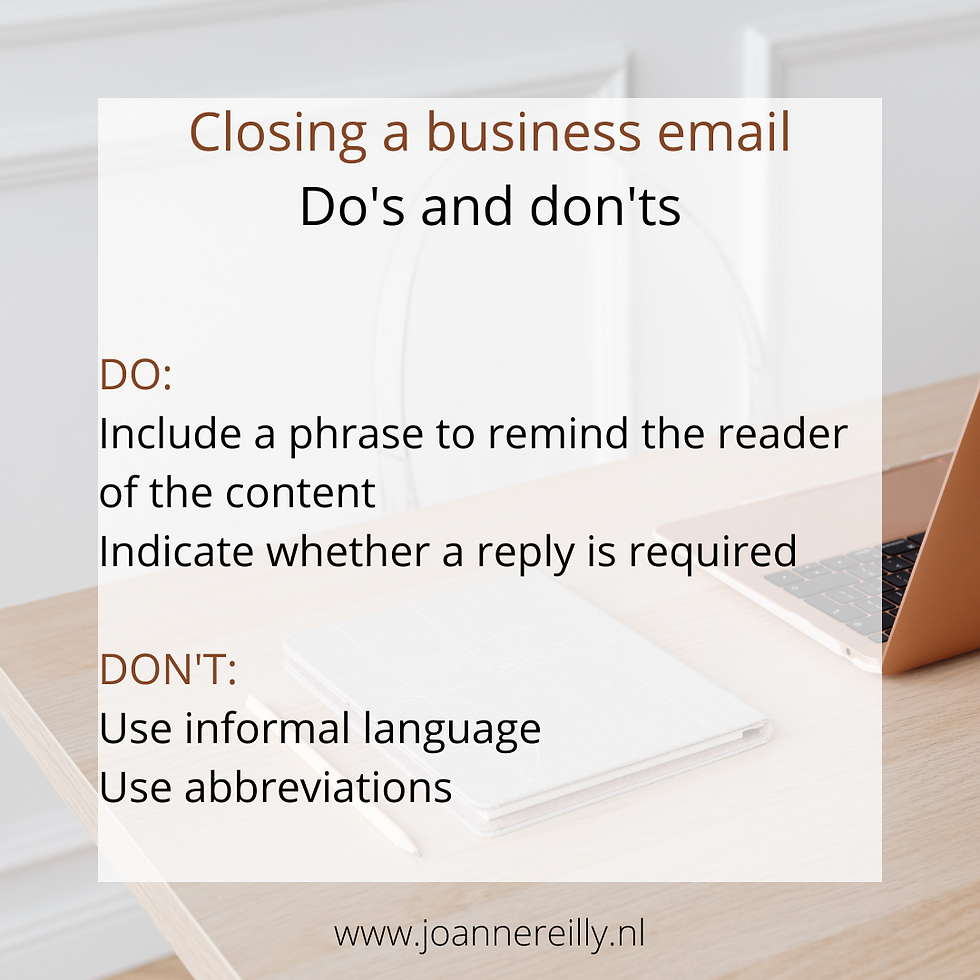Formal and informal emails. What's the difference and why is it important?
- Joanne

- Aug 26, 2024
- 4 min read
Updated: Sep 17, 2024
Check out these 7 tips for writing emails at work.

Writing an email at work can be stressful. You want to give your reader the best impression of yourself and your organisation, share your knowledge, and provide your opinion. There is so much to think about, and add to that you want to make sure the tone of your email is appropriate.
The tone of an email will vary depending on who you are writing to. You would not want to appear too informal when talking to a new customer, nor too formal when talking to your colleagues.
What's the difference?
Formal and informal writing are different in structure and tone.
Formal writing follows structured rules and conventions, maintaining a professional tone.
In contrast, informal writing is more relaxed and conversational, often using personal language and expressions.
Understanding these distinctions is important for communicating effectively in various situations.
How do I use my writing to show that I am being formal or informal?
As a TEFL* teacher I have delivered many business, and exam, English classes on this subject and am happy to share my top tips with you.
*TEFL - Teaching English as a Foreign Language
Tip #1 - Know your audience
Who are you writing to? This will help you to decide whether to use a formal or informal tone.
Formal emails are to:
People you don't know anything about.
The first email you send to a company or new contact.
Informal emails are to:
People you know very well such as colleagues or regular business contacts.
People you have exchanged greetings with before who email you in an informal way.
Tip #2 - Start out well
Some examples of how to start each type of email:
Formal Informal
Dear Sir / Madam, Hi Jane,
Dear Mr Smith, Hello team,
Dear Ms Jones,
Check out this blog post Writing a business email in English - how to start, the do's and don'ts. (joannereilly.nl) for more detailed information.
"The way you present yourself through your emails is a big deal. Why? Because it’s a direct reflection of you as a professional." Robby Salverton, multimedia editor at Upjourney.com
Tip #3 - Keep it formal, or don't
Once you have set the formal tone, keep it formal by avoiding the use of contractions.
What are contractions?
We contract a word using an apostrophe to shorten it. For example:
Do not - don't it is - it's
Can not - can't I am - I'm
Will not - won't That is - that's
It's ok to use contractions if you're using an informal tone. They are used to keep the tone relaxed and conversational, as if you were talking to your reader face to face.
Tip #4 - Keep it less personal
Try using the passive voice when writing a formal email. This way of writing takes out the people, leaving the facts. It can be especially useful if a difficult subject needs to be discussed or to give a professional tone to your writing.
The delivery was damaged when it arrived. (passive - focus on the delivery)
Someone damaged our delivery before it arrived. (active - focus on someone)
Traditional recipes are used for all of our dishes. (passive - focus on traditional recipes)
We make all of our dishes from traditional recipes. (active - focus on we make)
Tip #5 - Phrasal verbs
An informal email can include phrasal verbs, these are phrases we use in everyday speech.
In contract, they should not be used in a formal email since they are everyday conversational expressions.
Let's look at some examples to explain this further:
We can't put up with late deliveries any longer. - informal
Late deliveries will no longer be tolerated. - formal
They went over the details. - informal
They analysed the details. - formal
Tip #6 - End on the right note
Keep the tone of your email consistent all the way through to the end.
If you started formally, end formally.
If you started informally, end informally.
Here are some suggestions on how to do this:
Thanks in advance for your reply. - formal
Hope to hear from you soon. - informal
I look forward to working with you on this project. - formal
It will be fun to work together on this! - informal
Looking for more suggestions?
Check out this blog post: Closing a business email in English - do's and don'ts (joannereilly.nl)
Tip #7 - Put it into practice
You've read all the tips, now don't be afraid to try them out for yourself.
Still not sure?
Take the quiz to find out how much you know!
Leave a comment and let me know how you get on.
Contact me to arrange a personalised coaching session on this topic.
Quiz
Are the following sentences formal or informal?
The latest results show that customer satisfaction has dropped.
Our customers aren't happy with us at the moment.
The quality of food at our latest team building event was exceptional.
We had a great lunch on our team building day.
It looks like we'll have good sales in the next three months.
The projected sales figures for next quarter are very healthy.
You haven't paid last month's invoice yet.
The invoice for last month has not yet been settled.
The book received many positive reviews.
Lots of people liked the book.
Answers
Formal
Informal
Formal
Informal
Informal
Formal
Informal
Formal
Formal
Informal








Comments